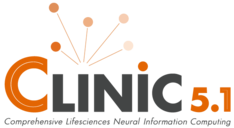CLINIC 5.1 – Comprehensive Lifesciences Neural Information Computing

Every day physicians are faced with numerous decisions in clinical practice that they must make to achieve the best possible therapeutic outcome for the respective patient. Unfortunately, it is an unchanged core problem of medicine that for many disease entities the success of therapy can only be predicted with a statistical probability. The prognosis for the individual patient, on the other hand, remains completely uncertain: in the sense that it is not possible to predict exactly how the individual patient will respond to a specific therapy. The heuristic method of consecutive trial-and-error treatment very often results in a valuable loss of time and resources for patients, which can also have a negative impact on the therapy outcome.
As part of the CLINIC 5.1 project, industry, the German Cancer Research Center (DKFZ) and the University of Heidelberg, together with Heidelberg University Hospital, are developing new and market-oriented forms of AI-based decision support for physicians, using prostate carcinoma as an example. In this way, innovative tools for decision support based on previous therapies, diagnoses and studies can be established in all phases of diagnostics, therapy recommendation and therapy implementation - a forward-looking step towards personalized medicine including new patient-oriented and ethical treatment strategies with the possibility of individually tailored therapy recommendations.
Thus, the available diagnosis- and therapy-relevant data will be expanded and multilaterally integrated in order to map the respective patient four-dimensionally and virtually as accurately as possible. The high-quality and medically and economically valuable treatment data of tumor patients collected at Heidelberg University Hospital, some of which has been available for almost thirty years, enables AI algorithms to be trained efficiently and effectively. In particular, "data as an economic asset" will be considered. Using the example of prostate carcinoma, the consortium partners of CLINIC 5.1 are working out the economic use of Big Data and the intelligent application of these data for decision support in clinical practice. CLINIC 5.1 can also serve as a pioneering development for other disease patterns and thus advance the development and implementation of AI applications in other areas of medicine.
Project partners:
• Deutsches Krebsforschungszentrum (DKFZ)
• Drägerwerk AG & Co. KgaA (associated)
• KARL STORZ SE & Co. KG
• mbits imaging GmbH (associated)
• SAP SE
• Siemens Healthineers AG
• Universität Heidelberg, Physikalisches Institut
• Universitätsklinikum Heidelberg
• Universitätsmedizin Mannheim, Klinik für Radiologie und Nuklearmedizin (associated)
Project Coordinator:
Universitätsklinikum Heidelberg
Im Neuenheimer Feld 420
69120 Heidelberg
Project duration: March 2021 - August 2023
Total cost: 9.5 million euros
Total funding: 7.5 million euros
